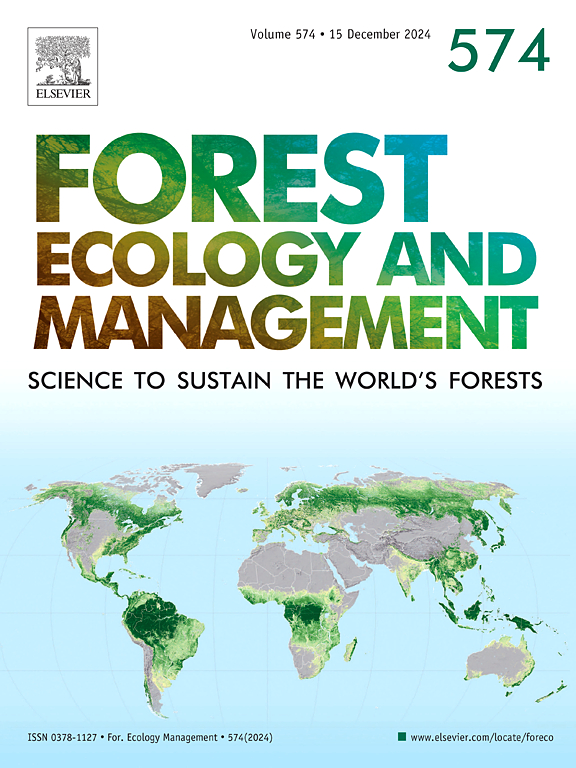土壤和微生物化学计量学对全球森林植物碎屑减少的不同响应
IF 3.7
2区 农林科学
Q1 FORESTRY
引用次数: 0
摘要
碳(C)、氮(N)和磷(P)的化学计量平衡是陆地生态系统初级生产力、养分循环和食物网动态的基础。然而,由于人类引起的全球变化,植物碎屑输入的减少威胁到这些平衡。虽然植物碎屑是森林土壤中碳、氮和磷的重要来源,但其减少对土壤有机质和微生物生物量(即土壤和微生物C:N:P)化学计量的影响仍然知之甚少。在此,我们对134项研究的1524项观测结果进行了荟萃分析,以评估植物碎屑去除对全球森林土壤和微生物C:N:P的影响。结果表明,去除植物碎屑可显著降低土壤C:N 2 %,C:P 5 %,N:P 5 %。相反,微生物C:P显著提高52% %,微生物N:P显著提高60% %。阔叶林微生物C:P的增加比针叶林更明显,表明微生物P限制随着碎屑输入的减少而加剧,特别是在阔叶林。这些发现揭示了土壤和微生物化学计量学对植物碎屑去除的解耦,可能是由微生物P利用策略的转变驱动的。通过强调植物碎屑去除后微生物磷限制的潜在增强及其对养分平衡和土壤碳封存的影响,我们为森林管理提供了有价值的见解。本文章由计算机程序翻译,如有差异,请以英文原文为准。
Divergent responses of soil and microbial stoichiometry to plant detritus reduction across global forests
The stoichiometric balance of carbon (C), nitrogen (N), and phosphorus (P) is fundamental to primary productivity, nutrient cycling, and food web dynamics in terrestrial ecosystems. However, the decline in plant detritus inputs due to human-induced global changes threatens these balances. Although plant detritus serves as a critical source of C, N, and P for forest soils, the consequences of its reduction on the stoichiometry of soil organic matter and microbial biomass (i.e., soil and microbial C:N:P) remain poorly understood. Here we conducted a meta-analysis of 1524 observations from 134 studies to assess the effect of plant detritus removal on soil and microbial C:N:P across global forests. Our results showed that plant detritus removal significantly decreased soil C:N by 2 %, C:P by 5 %, and N:P by 5 %. Conversely, it significantly increased microbial C:P by 52 % and microbial N:P by 60 %. The increase in microbial C:P was more pronounced in broadleaved forests than in coniferous forests, suggesting an aggravating microbial P limitation in response to declining detritus inputs, especially in broadleaved forests. These findings reveal a decoupling of soil and microbial stoichiometry in response to plant detritus removal, likely driven by shifts in microbial P utilization strategies. We provide valuable insights for forest management by highlighting the potential intensification of microbial P limitation following plant detritus removal and its implications for nutrient balance and soil C sequestration.
求助全文
通过发布文献求助,成功后即可免费获取论文全文。
去求助
来源期刊

Forest Ecology and Management
农林科学-林学
CiteScore
7.50
自引率
10.80%
发文量
665
审稿时长
39 days
期刊介绍:
Forest Ecology and Management publishes scientific articles linking forest ecology with forest management, focusing on the application of biological, ecological and social knowledge to the management and conservation of plantations and natural forests. The scope of the journal includes all forest ecosystems of the world.
A peer-review process ensures the quality and international interest of the manuscripts accepted for publication. The journal encourages communication between scientists in disparate fields who share a common interest in ecology and forest management, bridging the gap between research workers and forest managers.
We encourage submission of papers that will have the strongest interest and value to the Journal''s international readership. Some key features of papers with strong interest include:
1. Clear connections between the ecology and management of forests;
2. Novel ideas or approaches to important challenges in forest ecology and management;
3. Studies that address a population of interest beyond the scale of single research sites, Three key points in the design of forest experiments, Forest Ecology and Management 255 (2008) 2022-2023);
4. Review Articles on timely, important topics. Authors are welcome to contact one of the editors to discuss the suitability of a potential review manuscript.
The Journal encourages proposals for special issues examining important areas of forest ecology and management. Potential guest editors should contact any of the Editors to begin discussions about topics, potential papers, and other details.
 求助内容:
求助内容: 应助结果提醒方式:
应助结果提醒方式:


